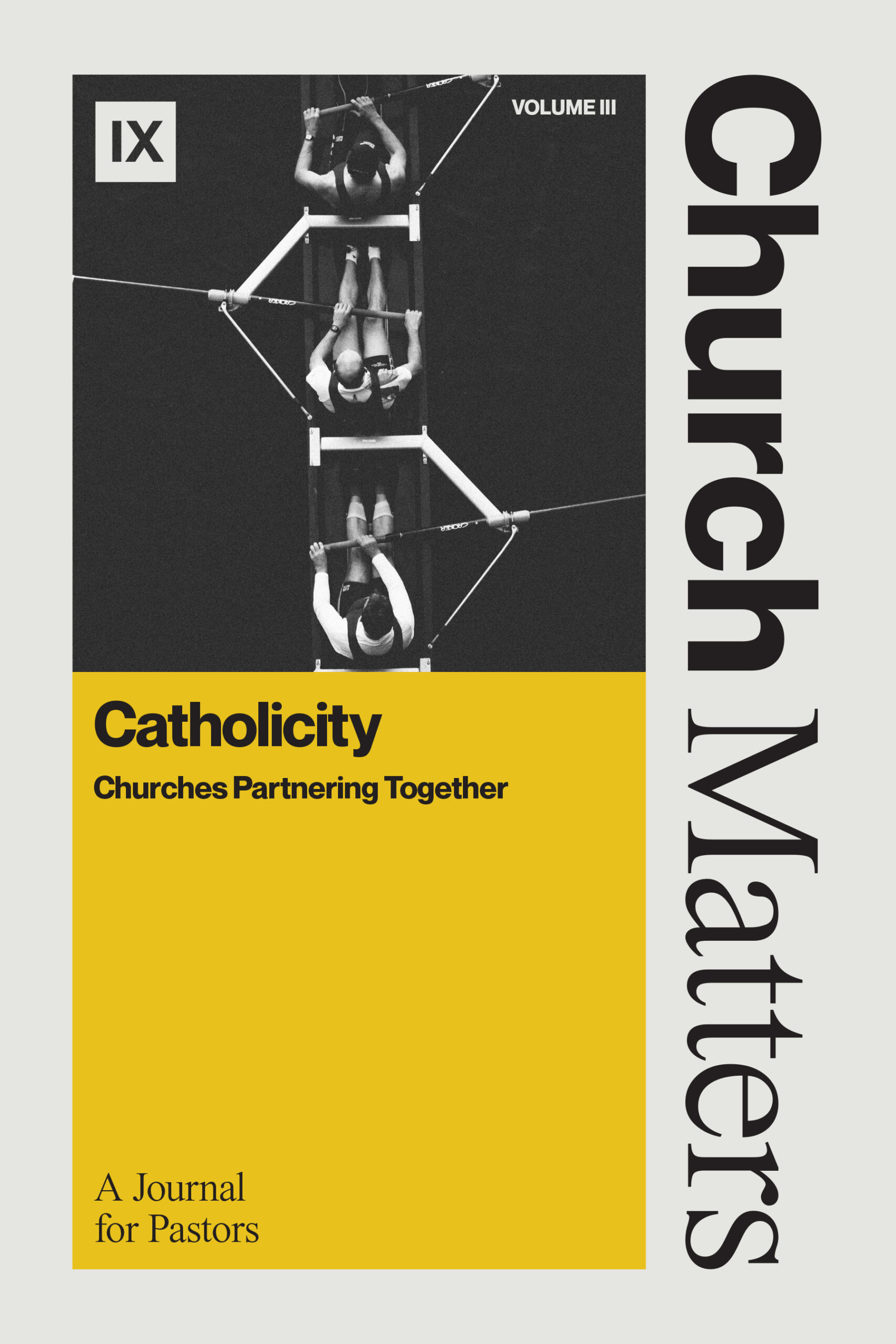The Great Commission Is Bigger Than Your Church
The Great Commission is bigger than your local church. How should that shape your priorities and posture as a pastor?
Jesus commanded his disciples to make disciples of all nations, baptizing them in the name of the Trinity, and teaching them to obey everything he commanded (Matt. 28:19). And he promised to be with them to the end of the age (Matt. 28:20). This charge is global in scope. Therefore, the Great Commission necessarily involves more than one local church.
After all, a church in Uganda can’t do much to make disciples of native Argentineans. Of course, they can send missionaries to Argentina, but then those missionaries will evangelize, disciple, plant a church, and the whole process starts over.
Because each of our churches is engaged in a mission that is bigger than any of them, we should proactively partner with other churches in order to fulfill it. Many churches’ denominational ties aim at this kind of partnership. But I’d like to suggest that the Great Commission should form in us, and in pastors in particular, a more pervasive posture of partnering with other churches to fulfill the Great Commission.
In other words, pastor, don’t consider your denominational affiliation or the money you give to missions to be your only or even primary means of fulfilling the great commission beyond the confines of your church. Instead, I’d argue that Scripture would also have you cultivate a posture of building partnerships with other pastors and churches in order to promote the gospel in your region and around the world.
MUTUAL CARE, MODELING, AND THE GREAT COMMISSION
In a variety of ways, this is just what we see the churches of the New Testament doing.
Mutual Care between Jerusalem and Antioch—and Beyond
First, it’s clear that the apostles desired to promote unity, harmony, and like-mindedness between local churches. For instance, when the church in Antioch saw a “great number” of Greeks come to faith (Acts 11:21), the apostles sent Barnabas to go and see what the Lord was doing (v. 22) and to strengthen these new believers in the grace of God (vv. 23-24).
The apostles in Jerusalem wanted to know what was happening in Antioch. They wanted to ensure that the churches in Jerusalem and Antioch were on the same theological page. And they wanted to help ensure that these new believers were growing strong in the faith. So, they sent one of their best men to minister to them.
As a result of this partnership between Jerusalem and Antioch, the church in Antioch learned in advance about the famine and hardship that were going to come upon the believers in Judea (Acts 11:27-28). So, when the time came, they sent aid to them by Barnabas and Saul (vv. 29-30). The church in Antioch supplied what the church in Jerusalem lacked—in this case, money to survive a famine.
A similar motivation drove Paul to devote so much effort to securing an offering for the Judean church from Gentile churches throughout the Mediterranean (Rom. 15:26-28; 1 Cor. 16:1-4; 2 Cor. 8:1-15). Paul reasoned that if these Gentile believers have come to share in the Jewish believers’ spiritual blessings, they “ought also to be of service to them in material blessings” (Rom. 15:27).
Although this particular theological rationale may not apply to most churches today, our churches still have ample reason to care for other churches’ needs, since we all belong to the same body (Eph. 1:22). And if we should be concerned for our sister churches’ material good, how much more should we do what we can to promote their spiritual health?
So, the apostles cared for the church in Antioch, the church in Antioch cared for the saints in Jerusalem, and Paul led churches around the Mediterranean to provide for the needs of the church in Jerusalem as well. And although the apostles are no longer around, I’d suggest that the priorities reflected in these passages should be found in pastors and churches today.
Pastors should lead their churches to care for other churches, and to strive for unity, partnership, and like-mindedness between local churches. Further, they should lead churches to partner with other churches not only when there are needs to be cared for, as we see in Acts 11 and Romans 15, but also when there are opportunities to advance the gospel. Pastors should take an interest in the spiritual health of other churches and in what healthy churches working together can accomplish for the sake of the gospel.
My concern here is not so much with the fact that these churches cared for each other in physical ways, but with the spirit of unity and cooperation which that care demonstrated. These churches understood themselves to be playing on the same team. They knew they were working for a common cause. They knew that God’s kingdom, and the mandate to spread the reach of that kingdom through disciple-making, was far bigger than their local church.
Local Churches as Models for Other Local Churches
Another way we see local churches helping other local churches to fulfill the Great Commission in the New Testament is that some churches serve as godly examples for other churches. Just as individual Christians grow in grace, in part, through imitating godly examples (1 Cor. 4:17, 11:1; Phil. 3:17), so also entire local churches serve as models for other churches.
Consider, for instance, what Paul says in 1 Thessalonians 1:6-8:
And you became imitators of us and of the Lord, for you received the word in much affliction, with the joy of the Holy Spirit, so that you became an example to all the believers in Macedonia and Achaia. For not only has the word of the Lord sounded forth from you in Macedonia and Achaia, but your faith in God has gone forth everywhere, so that we need not say anything.
Paul rejoiced not only in the Thessalonians’ faith and their boldness in evangelism, but in the fact that these things had come to serve as examples for the believers throughout the surrounding regions (cf. Rom. 1:8, 16:19). Paul celebrates this church’s role as a model for other churches, just as the Thessalonians themselves had become imitators of Paul, the Lord, and “the churches of God in Christ Jesus that are in Judea” (1 Thes. 2:14).
Just as Paul can say to the Corinthians, “Be imitators of me, as I am of Christ” (1 Cor. 11:1), so also local churches today—at least mature, healthy ones—should be able to say the same to other churches. So what is your church doing to help other churches fulfill the Great Commission by walking in your footsteps?
And if your church is weak in certain areas, seek out pastors and churches who can serve as models to you. There’s no shame in seeking to grow wise by walking with the wise (Prov. 13:20).
A Catholic Posture Not Limited to the Apostles
These are just a few of the ways that the earliest churches bore witness to their understanding that the Great Commission is bigger than any local church. For example, they also sent out, supported, and received Christian workers who ministered outside the “four walls” of their churches (Acts 13:1-3; Phil. 4:10-20; 3 John 5-8).
In all these ways and more the earliest Christians demonstrated a Great Commission-prompted posture of not only taking the gospel to the nations, but also of caring for and partnering with other churches toward that same end.
In other words, the catholic posture of concern for all the churches (2 Cor. 11:28) wasn’t limited to the apostles. Instead, churches sought each other’s good in order to advance the gospel.
PART OF YOUR JOB DESCRIPTION
Among Christians today, pastors bear a special responsibility for embodying this kind of the-Great-Commission-is-bigger-than-my-church posture. If pastors don’t strive to help other churches, not many in their churches will. But if pastors build partnerships with other churches, that opens up countless opportunities for the members of those churches to work together.
In other words, pastors are responsible for equipping their churches to fulfill the Great Commission (Eph. 4:11-16). So pastors should consider it to be part of their job description to support, care for, and build partnerships with other pastors and churches for the sake of making disciples of all nations.
WHY YOU SHOULD INVEST IN YOUR FELLOW PASTORS
One of the primary ways this posture should play out is in concern for fellow pastors. Why? Because one of the best ways to invest in the progress of the gospel in your community and beyond is to invest in your fellow pastors.
Consider your own needs as a pastor. How often have you wondered how other faithful pastors handled a particularly thorny issue you were facing? How often have you felt isolated, burdened, and discouraged in your work? How often have you felt like there was no one you could talk to?
If your answer to any of these questions is “Often enough,” then you know from experience that pastoral ministry can be discouraging, isolating, and confusing. And you know either from experience or from lack of experience that fellowship with other pastors can provide crucial help for your ministry.
Proverbs says, “Where there is no guidance, a people falls, but in an abundance of counselors there is safety,” and, “By wise guidance you can wage your war, and in abundance of counselors there is victory” (Prov. 11:14, 24:6).
A pastor’s primary counselors in ministry should be his fellow elders, but many pastors lack such co-laborers. Who then are the brothers he can turn to in the day of adversity (Prov. 17:17)?
Often, fellow pastors will provide the most helpful, encouraging, and enlightening friendship for a pastor. Pastors know each other’s struggles. They’re able to say, “I’ve been there”—maybe even, “I’m there right now.” And older, more seasoned pastors in particular can offer unparalleled counsel and encouragement to a struggling brother in the ministry. Yet too few pastors seek or give this kind of relational care.
If a faithful brother across town is on the verge of burnout, or is about to split his church through youthful impatience, how does that serve the Great Commission? If you care about the progress of the gospel and not merely the prosperity of your own church, you should strive to befriend and encourage fellow pastors in your area.
Don’t isolate yourself from other pastors’ encouragement, and don’t leave them isolated from yours. Instead, may your earnest counsel gladden your brother pastors’ hearts (Prov. 27:9).
A FEW PRACTICAL SUGGESTIONS
So, pastors should have a burden to spread the gospel and make disciples through partnering with other churches. And one of the most direct ways to do this is to befriend, care for, encourage, and disciple fellow pastors.
What then are some specific ways these partnerships and pastoral friendships can help to advance the gospel? This Journal is packed with practical examples, so I’ll just quickly mention a few here to fuel godly imagination.
1. Local Evangelism
Churches can work together to host public evangelistic events, reach out to specific neighborhoods, and more. Often, an evangelistic effort that one church alone couldn’t support could be pulled off fairly easily if three or four churches worked together. And the picture of different churches working together highlights the unifying power of the gospel.
2. Global Evangelism
American churches of many denominations have long partnered together to send missionaries overseas. For some denominations, this kind of partnership is one of their primary reasons for existing. Yet partnering for missions should consist in far more than mailing in a check each year.
What if your church and a couple other like-minded congregations are each able to send one individual or couple onto the mission field in the next couple years? And what if, instead of hurling them out individually into uncharted territory, you sent them out as a team? Your church alone might not be able to send a whole team of missionaries, but if you partner with other like-minded churches, that might just become a reality.
3. Church Membership and Discipline
Church discipline doesn’t work so well if the excommunicated individual can simply walk down the street and join another evangelical church with no questions asked. I believe that churches should be independent, so they’re not irrevocably bound by another church’s act. But it’s plain that our churches would be healthier overall if we worked together to maintain a pure witness to the gospel.
So, for example, if a prospective member at your church has left another solid evangelical church in your town, find out why. Follow up with the leadership of that church. Make sure that the person isn’t fleeing discipline or leaving a mess in their wake.
Obviously, these kinds of situations can get complicated quickly, but that’s just the point. Your church should be working together with other churches to ensure, to the best of your limited and fallen ability, that your church is representing Christ well to the world and faithfully protecting his name.
4. Pastor Training and Placement
Partnering with other churches multiplies your ability to raise up pastors in your local church. For instance, at least one church here in Louisville invites other local pastors to come teach their pastoral interns in order to offer a different perspective and complement their pastoral strengths.
Or consider pastoral placement. The more local pastors you befriend, and the more churches your church is on good terms with, the more you’ll be able to help connect godly pastoral candidates with churches that need them. And if you’ve got a reputation for godly leadership and selfless care for others, then a recommendation from you might go a long way toward helping another church find a man who will lead them well.
5. Church Planting and Church Revitalization
It doesn’t take a big church to plant churches. It might just take three small churches getting together to pool resources and leadership. If there are other like-minded churches in your area, why not partner with them to plant churches? What if you’ve got twenty members who live a half hour away in an under-served town, another church has a godly, qualified leader looking to plant, and a third church has some extra money in their missions budget?
And generally, church revitalizations will only happen through churches partnering together for the sake of the Great Commission. One church has to be willing to give, another to receive.
LOOK OUTWARD
The Great Commission calls us to take the gospel to those who have never heard it. It calls us to go to the nations. In other words, it calls us to look and move outward. In a similar way, the Great Commission should form in pastors a posture of seeking out the gospel growth of other pastors and churches. And it should form in pastors a desire to advance the progress of the gospel through and together with other like-minded pastors and churches.
Pastors aren’t called to shepherd other people’s churches, but they can help strengthen them. And they can help to spread the gospel more broadly and deeply by working together with them. And, while I don’t think the Bible puts any pastors in formal oversight over others, pastors need counselors as much as anybody—and fellow pastors are the best candidates for that job.
So, pastor, what can you do to partner with other pastors for fellowship, encouragement, and disciple-making? What can you do to link arms with other local churches to fulfill the Great Commission in your city and around the world? How does your ministry reflect the fact that the Great Commission is far bigger than your local church?
Related Multimedia











